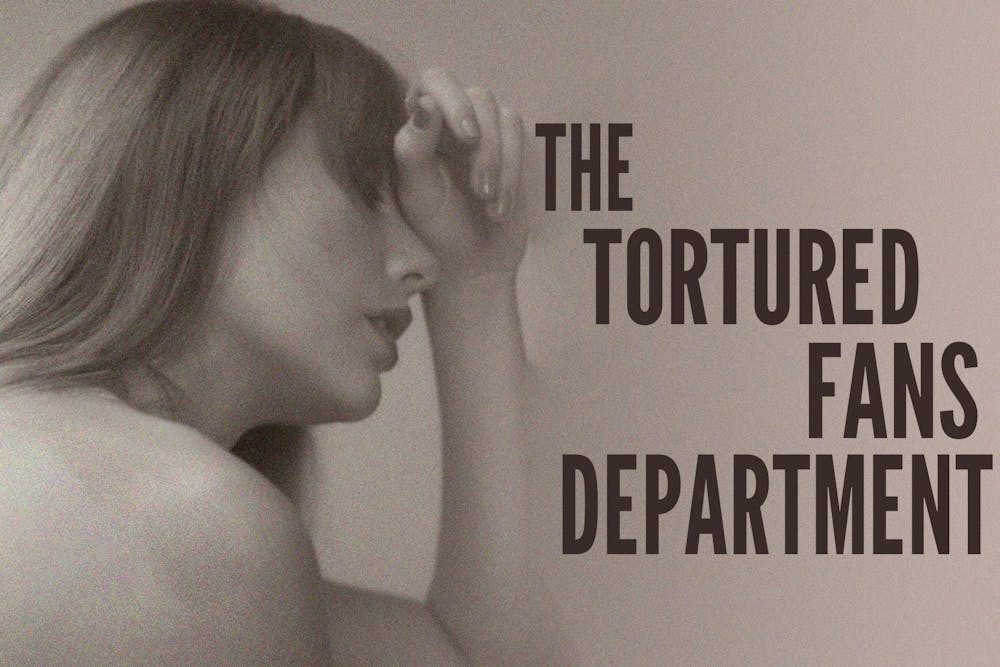Taylor Swift got on stage at the Grammys earlier this year to accept her first award of the night (her 13th Grammy ever) and announced the release of her 11th album, titled “The Tortured Poets Department.” With the rate at which Swift is pumping out music nowadays, everybody was waiting for the newest breakup album, this time from her longest relationship to date. Fans in a frenzy anxiously awaited what this album, whose title teased possibly some of the most interesting lyrics to come from Swift’s pen, would sound like. What many expected to sound much more like “folklore” because of the title actually took everyone by surprise after seeing Post Malone and Florence & The Machine featured on two of the tracks.
The song titles were already a deviation from Swift’s usual shorter titles without punctuation, another nod to the poetic nature of the album. Taking this into account, I sat down at 12:01 a.m. on April 19 and pressed play on the 16 track album, only to find a “Midnights”-esque vibe with a bit of Lana Del Rey and The 1975 sprinkled throughout. I will admit I was confused after my first listen. I clocked the incredible lyricism in “So Long, London” (track 5!) and the bopability of “I Can Do It With a Broken Heart” immediately, but I was a bit bothered by a lot of the production because it sounded replicated from other music, both Taylor’s and other projects Jack Antonoff has worked on.
While I have zero qualifications regarding production, and therefore have no authority to tell 10-time Grammy winner Jack Antonoff how to produce music, I do fall into the group of fans that believe Antonoff and Swift are exhausting their originality. Many of the tracks on TTPD, while objectively good tracks, sounded too similar to each other to be on an album back to back. I finished my second listen of TTPD and texted my friends I gave it a generous 6/10, knowing that some of the songs would grow on me (namely “Down Bad” and “Who’s Afraid of Little Old Me?”).
By that point, the countdowns had all hit 0:00 on Taylor Swift’s website, and what I assumed would be a few extra tracks ended up being a second album (!!!!). I was ecstatic seeing that most of THESE tracks were Aaron Dessner productions. I may be biased, but on her last few albums, his production has always been my preferred method of execution for her lyrics. “TTPD: The Anthology” was the album I was waiting for, and after my first listen I gave it a 10/10. It is an older sister to “folklore” and “evermore” and has more of that storytelling and worldbuilding specificity that Taylor Swift has always been known for. Tracks like “I Hate It Here” and “The Manuscript” brought me to tears, and others like “Peter” and “Cassandra” had me giddy as a PLS major thanks to their literary references.
For me, “The Anthology” saved TTPD as a project. Whereas I was not very impressed with the first 16 tracks, I was in awe of the last 15. But one thing the entire project showed me was Taylor Swift’s versatility. As one of my favorite music reviewers Nathan Hubbard said in a series of posts on X, the albums displayed the safety Swift was looking for in creating this vulnerable of a project, being in such a delicate mental place after such a hard break up. If there is one thing certain, it is Swift feels safe with Antonoff and Dessner as a musician, and whether one or the other is more the listener’s taste is subjective I guess. Overall, I would give the project an 8/10, but perhaps some numbers will change after a few more days of streaming. If I know one thing as a Swiftie, it’s that the theories and backstories always make the tracks more interesting to listen to, so maybe the Matty Healy references won’t be as cringy once I fully understand what they mean.










